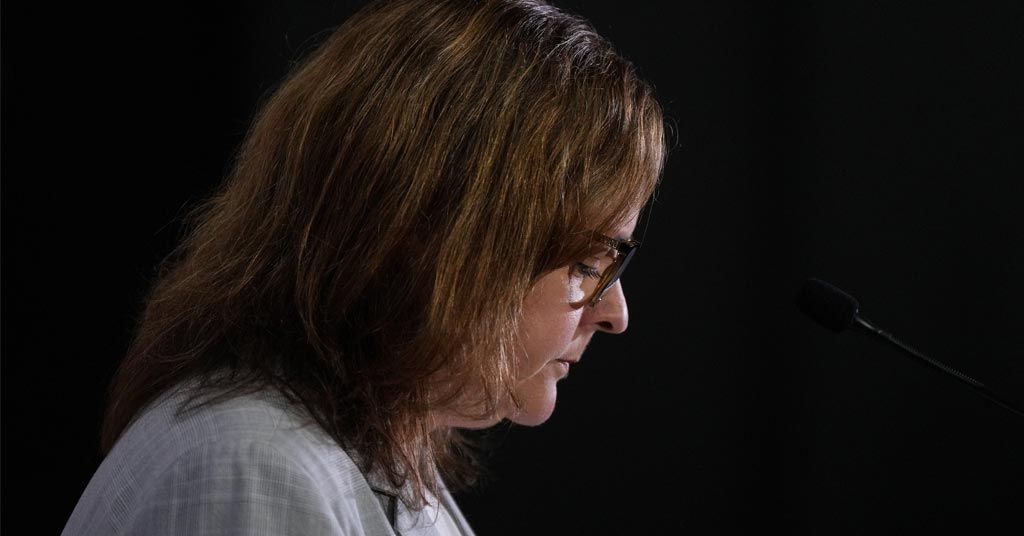
Heather Stefanson Has ‘No Plan’ To Fix Manitoba’s Healthcare System, Advocates Say
Staffing strategy nothing more than “numbers on a website”
Manitoba PC leader Heather Stefanson’s strategy to recruit more health care staff is being criticized by advocates and workers who say the PC’s plan is nothing more than “numbers on a website.”
The Manitoba PCs recently promised an additional $120 million for their Health Human Resources Action Plan to recruit more health care workers to address the staffing crisis.
However, the PCs have provided “no information whatsoever” on how this money will be spent, according to the Manitoba Health Coalition.
“The only reason they can say they have a Human Resource Action Plan is because they have a website that has those words,” MHC Provincial Director Thomas Linner told PressProgress. “There is no healthcare staffing plan in the province of Manitoba as it stands right now.”
The Manitoba PCs claim to have recruited 2,000 health care workers already. The PC government recently recruited over 300 health care workers from the Philippines to fill positions in Manitoba, saying this recruitment aligned with their Human Resources Action Plan. However, the HHRAP website has no details on what the recruitment strategy specifically looks like from the Philippines, across Canada, or Manitoba.
“It has no metrics, it has no deliverables, it has no targets, it has no dates,” Linner said. “It has no information whatsoever about what the plan actually can accomplish, when it can be accomplished by, and what its priorities are.”
The Manitoba PCs record on cost cutting and privatizing health care helped create the staffing crisis, Linner noted. The MHC has tracked the PCs cuts to health care since the party took power in 2016. Linner said Stefanson’s approach to health care hasn’t been much different than her predecessor, Brian Pallister.
“Remember, she had been health minister through the third wave, through some of the worst impacts of COVID-19,” Linner said.
“There was a real opportunity for her to break with Brian Pallister’s path, to say, ‘Hey, I’ve seen the impacts of this firsthand and I’m going to do what it takes to invest in our frontline healthcare services, to reverse some of the most egregious decisions that have been made around emergency rooms and all the rest, and chart a new path forward.’ And she chose very specifically not to do that.”
Stefanson’s belief that the private sector will improve health care is also flawed, Linner added.
“We have seen, consistently, chaos for families, and the privatization of services – which is marketed as a silver bullet to solve the problems caused by the cuts and chaos in the first place.”
The MHC has also launched a Public Health Care Voter’s Guide tracking each party’s position on health issues, such as privatization, reproductive rights, mental health and addictions, senior care, and social determinants of health.
Healthcare staffing crisis created by PC cuts, nurses say
Manitoba Nurses Union President Darlene Jackson says the PCs cuts have “absolutely decimated” Manitoba’s public health care system.
PC cuts to health care forced many nurses out of the public system entirely, or into private contracting agencies in search of better pay and work life balance, Jackson explained. This has allowed private nursing companies to profit off a staffing crisis created by the government, and also gives these private companies increased power over the delivery of public health services.
The province spent $60 million on private nursing agencies last year, according to the Winnipeg Free Press, which is a 47% increase in spending over the previous year.
“Our tax dollars fund health care and that money is coming directly out of our health care budgets, so I am shocked that the public is not more outraged with the amount of money that is going to these private agencies,” Jackson said.
The Manitoba PCs have also conducted only two consultations with nurses from two of the five health regions, Jackson notes, adding that none of the concerns brought up in those meetings have been addressed by the government.
“If you’re going to talk the talk, you better walk the walk. And that is not what this government is doing,” Jackson said.
Full-time jobs replaced with precarious, part-time jobs
Debbie Boissonneault, President of CUPE 204, says Stefanson’s treatment of healthcare support workers has been “terrible.”
“She won’t even respond to an email if I sent her an email. She does not listen to the people that actually work on the frontlines,” Boissonneault told PressProgress.
Many health care workers lost their jobs in 2017 when the PC government began restructuring the healthcare system, Boissonneault said. Many full-time positions were also deleted and replaced with part time positions, increasing precarious work for health care support workers. This restructuring process happened not just once, but many times, upending many workers’ lives.
Boissoneault says her own job of 23 years was deleted, forcing her to apply for another position where she had less experience.
“I have never seen as many tears in all my life that I did in 2017,” Boissonneault said.
When the COVID-19 pandemic hit, personal care home workers working multiple jobs to make ends meet suddenly weren’t allowed to work in more than one personal care home, but they could still work second jobs outside the healthcare system, Boissonnealt explains.
“They’re now telling me I can go work at McDonald’s and work at a personal care home, but I can’t work in two personal care homes because I might bring COVID from one personal care home to the other.”
“The rules this government made up didn’t make any sense, and all it did is frustrate and take money out of the pockets of workers.”
In 2022, Seniors and Long-Term Care Minister Scott Johnson said the province would hire 350 new health care aids following a review of the deadly COVID-19 outbreaks in long-term care homes.
Boissoneault says those 350 positions have yet to be filled.
Patients pay the price of healthcare understaffing
The healthcare staffing crisis has also deeply affected patients and their families.
Boissoneault says her own father-in-law had heart surgery delayed during the early days of the pandemic, and he later chose to forgo the surgery altogether and only take medication.
A year later, Boissonault’s father passed away after spending eight hours at the hospital Observation Unit, which is a curtained off area in the Emergency Department where patients are assessed for admittance. It also took 15 minutes for a second nurse to come and confirm the death, Boissoneault recalls.
“I’ve done a lot of Code Blues in my life. I know what it’s like watching someone die,” Boissonneault explained.
“There had to have been anywhere between 50 to 100 people between the waiting room, the hallway, emergency and the observation area walking past. We had no privacy and no room to go to. We had just curtains around us surrounded by a stretcher.”
Boissoneault also says her father-in-law was denied an ambulance ride to the hospital just a week earlier, as paramedics suggested waiting for his medication to work instead. Boissonault believes her father-in-law had been misdiagnosed with pneumonia on a previous trip to the hospital after he had difficulty breathing.
“I can tell you as the [union] president and I can tell you as a family member what it feels like under the PC government,” Boissonneault said. “It literally is disheartening.”
Our journalism is powered by readers like you.
We’re an award-winning non-profit news organization that covers topics like social and economic inequality, big business and labour, and right-wing extremism.
Help us build so we can bring to light stories that don’t get the attention they deserve from Canada’s big corporate media outlets.
Donate



